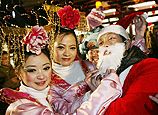
The State Council announced on Wednesday it will raise the pensions of retired enterprise employees this year.
It is the ninth consecutive year China has raised pensions for the group.
The State Council decided at an executive meeting presided over by Premier Wen Jiabao to raise the retired enterprise employees' pension by 10 percent from the 2012 level, or about 170 yuan ($27.30) per person per month, on Jan 1.
It is the first pension increase since Xi Jinping became top leader of the Communist Party of China.
In the past eight years, the average pension of retired enterprise employees increased from 700 yuan in 2005 to 1,721 yuan in 2012.
The meeting also urged the establishment of a mechanism to periodically adjust the pensions for retired enterprise employees.
Experts hailed the government's pension increase, saying the move shows the government's determination to close the group's pension gap with government officials.
China operates a twin-track pension system. The fiscal budget pays the contributions of employees of governmental organizations and institutions, but enterprise employees have to pay their contributions themselves.
Corporate employees pay 8 percent of their monthly wages to establish their pension accounts, and Chinese laws ensure that the more money workers pay into their pension accounts, the larger the pensions they will collect at retirement.
Workers must contribute for at least 15 years before they can receive a pension.
 |














 How hard to adopt an abandoned child in China?
How hard to adopt an abandoned child in China?


![]()
